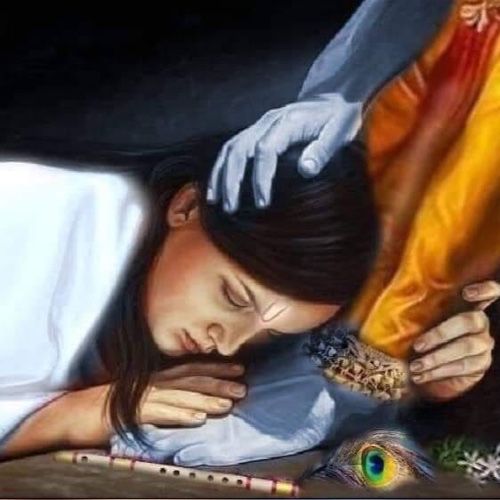Bhagwat Session 4
Shrimad Bhagavata Mahapurana
Synopsis of the Fourth Session
Bhagavata Pratham Skanda (Book One)
Chapter 1 to 6
—————
We bow our heads to the Transcendent Reality, from whom the universe springs up, in whom it abides and into whom it returns.
This age of Kali takes away the purity of peoples heart and is thus difficult to conquer. We turn to you, who confides even his profoundest secrets to their beloved devotees.
—————
Story:
The session started with a story of a King who wanted to know the secret of the bliss possessed by a ‘poor Gaadivan’. He approached him multiple times, but the Gaadivan refused to impart. Till one day the King came as a nobody, waited as a nobody, and sat down as a nobody. When he emptied himself of his lower self and ego, the Gaaidvan made him sit and shared his secret of ‘Never ending bliss’.
We enter ‘Shrimad Bhagavata Mahapurana’, as a nobody and bring our hearts to Naimisharanya where Shaunakji and his various disciples are listening to Sutadevji. They want to know more about Narad Muni, the boundless Sage.
Narad Muni, is the mind born son of Brahma. It all started when the divine desired creation, when Brahma, Vishnu and Mahesh came into existance. After thousands of years of mañana Brahma opened his eyes and came along Narad Muni and many others from his mind.
His cycle of decent or ascent, would leave this decision on you, started with a curse from Brahma, when Narad Muni refused to enter the ‘Grahasth Ashram’, and desired to just go around singing the glories of the Lord.
- He first became a Gandharva and after being cursed again
- He was born as a maid servants son
Here, he had the opportunity at a tender age of 5 to serve, holy men during their period of ‘Shetra Vanvas’ during the rainy chaturmas. Their company and eating parshad ignited in him the longing for God.
What followed, was a tragedy or blessing, again I leave it on you to decide. For, categorising an event as good or bad is a subjective matter. The saints left, and soon after he lost his mother also. He at this little age started wondering around in search of God. He got a glimpse of what he was looking for, only to be told he was not pure enough to hold this vision any longer and again in this life.
He devoted his life to purifying himself, gained Bhakti, gyan and Vairagya. He broke the Shackles of Karma and on death merged with that Divine and was manifested again as the mind born son of Brahma, the Mukt, boundless Narad Muni.
Points to Ponder:
One Becomes Many -
Supreme person, who is beyond it all, became Hari, Hara, Virnchi
This entire universe is made up of Satva, Rajas and Tamas. But, the one who made these is beyond the Gunas, rid of all cravings, free from vanity and jealousy and content at heart. He is free from name and form.
He is the imperishable seed of various avtars. The avtars of the lord are numerous, all are nothing but the rays of the same divine power. In ‘Shrimad Bhagavata the following are glorified in detail;
1. The four unmarried sons of Brahmā [the Kumāras] also called as Sanat Kumāras.
2. Varaha avatar (Boar)
3. Devarṣi Nārada, who is a great sage among the demigods
4. Nara
5. Nārāyaṇa
6. Lord Kapila, foremost among perfected beings. He gave an exposition of the creative elements and metaphysics to Āsuri Brāhmaṇa.
7. Dattatreya, the son of the sage Atri. He was born from the womb of Anasūyā, who prayed for an incarnation.
8. Yajña, the son of Prajāpati Ruci and his wife Ākūti.
9. King Ṛiṣabha, son of King Nābhi and his wife Merudevī.
10. King Pṛithu who cultivated the land to yield various produce, and for that reason the earth was beautiful and attractive.
11. Matsya, The form of a fish.
12. Kūrma, The form of a tortoise.
13. Dhanvantari.
14. Jaganmohini.
15. Nṛsiṁha - The man lion form.
16. Vāmana, the form of a dwarf brāhmaṇa.
17. Parashu Rama.
18. Sri Rama, the son of Dasharatha.
19. Vyasa, the son of Parāshara.
20. Balarāma
21. Kṛṣṇa.
22. Buddha, the son of Añjanā, in the province of Gayā.
23. Kalki incarnation and become the son of Viṣṇu Yaśā.
The Oscillation
We are the wave who has forgotten that it is nothing but the ocean. We have all the qualities. However, they are unable to reveal themselves. The self oscillates between,
- Satvic, Rajasic and Tamasic tendencies
- Satyug, treat, Dwapar and Kaliyug
- Bhramin, Khastriya, Vaishyas and Sudra (not the vanrna based on work, but the qualities)
Beyond all this turmoil, the truth - Which is nothing but just being.
Drop the ‘I Am’ Ego - Ahenkar
When one is reduced to ‘a nobody’, only then does one earn the eligibility to actually receive the true knowledge and know about the truth. That is am,
‘Ishvar amsha jeev avinashi, chetan, amal, sahaj, sukh rashi.’
Pilgrimage, holy places, sat ka saang and Parshad
When one waits upon the divine sages and the holy people in the places of worship, when one keeps the company of the pure, it has a cleansing affect.
Everything that we intake in the company of such people, including the prashad from our mouth or the Bhajan/Shlokas from our ears, removes the layer which we have accumulated over various life times.
With every layer removed and with every stroke of cleaning, the self slowly but surely starts to reveal itself.
“Guru Govind Dono Khade, Ka ke lagu paye,
Balihari Guru aapki, Govind Diyo milaye.”
Gyan (Knowledge)
Knowledge alone is the reality, that knowledge which does not admit duality, that means which is indivisible, and one without a second. This is called by different names;
- Brahma (The Absolute)
- Paramatma (The supreme spirit of the Oversoul)
- Bhagavan (The Deity)
Sages who are full of faith, perceive that truth in their own self, in their own heart. This Bhakti (devotion) accompanied by Gyan (Knowledge) and Vairaga (love for all) can be attained by hearing of ‘Shrimad Bhagavata’.
Karma bandana - Break the Chakra of Karma
The moment one sees God in his very self and others. When he starts seeing no second. That very moment the ‘Doership and the I’ dissolve and the knot of ignorance in his heart is broken, all the doubts vanish and the entire stock of his karmas get dissolved.
All activities of man mainly leads to transmigration, but the same, when offered to the Lord, lose their binding character
Who is a Mukht person or who has attained ‘Mukti-Liberation’?
When one is freed from the desire to be known, get respect and have fame, he can be called to have attained ‘Mukti’, or he is a ‘Jivan Mukt’. What binds us is nothing but our desires.
The one who is not bound by ‘Trishna or Ishnaye-Desires’
1. Lokeshna (desire for praise of people)
2. Vitteshna (greed and influence of money)
3. Putreshna (desire for existence)
A ‘Sadhak-Devotee’ is a person in whose heart;
- Sorrow does not stay
- Anger does not stay
- Vice does not stay
They might look as if they are being made, but they get washed out as they are being produced. Just like, when we draw something on water, it seems as if a line is being made but it does not stay. In the same way, when we draw something on the beach, as soon as the wave comes it is washed out, it does not stay.
A Materialistic person, who is engrossed in the material world has a heart where,
- Sorrow stays
- Anger stays
- Vice stays
They are not washed out as and when they are produced. Just like the a stone, when repeatedly hit by the wave, has a deep depression made on it, or a rock which when constantly churned with a rope bears the lines of the aberration caused by it.
Bhagavata Dharm
Dharm of a Devotee is to Love the Lord and his creation, in a disinterested fashion.
- It is free from all deceptions in the form of desire, even for Liberation.
- Devotion should be absolutely motiveless and without obstruction.
- A bhakh sit with utmost Shradha and Vishvas, and this compels even the rarest of knowledge to reveal itself.
- Eklavya’s shradha in his guru is a great example of the same.
- A bhakth enjoys journey and is not in a hurry to reach the destination. For a devotee, loving god is even more important than merging with him.
“I love God and His creation, because I love God and his creation.”
Dharm - What is my Dharm?
We can say righteousness. But, the full meaning of this word can not be described in English. Dharm is Dharm.
For instance,
What is the Dharm of Sugar?
The Dharma of sugar is to be sweet. No matter what you put it in. It does not leave its Dharm of being sweet, and sweetens the most bitter of things.
In the same way, we also have a Dharm. Our dharma is to every be in our Sat Chit Anand Swaroop.
“Sat-Chit-Ananda is a Sanskrit term and refers to the nature of the core of our Being or Self. Sat means Existence/truth. Chit means Consciousness. Ananda means Bliss.
Another way to look at it would be, we are nothing but eternal bliss and Love. My Dharm is to spread the same, for one can only give what one has, and we have nothing but, ‘Bliss and Love’ to share.
So my Dharm is Love and Bliss
Does this not make us do our duties with the beautiful colour of love?
My Dharm enables me to be a better mother..
My Dharm enables me to be a better friend..
My Dharm enables me to be a better Me..
May your Dharm, fill all your actions with the bright colour of Love and bliss
Happy Holi🌷
Jai Shri Krishna🙏
Jai hanuman🙏


